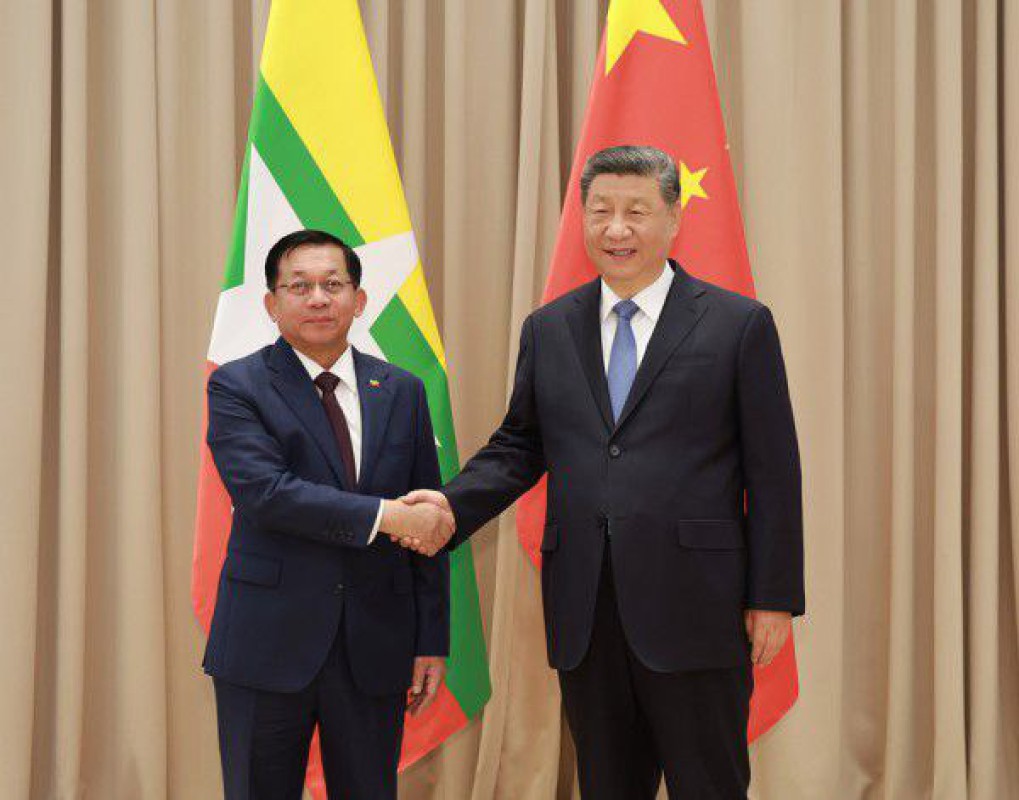Senior General’s China visit: A strategic pivot in Myanmar-China relations

1008

By Phyo Lin Aung
Senior General Min Aung Hlaing, chairman of the State Security and Peace Commission, will embark on a significant diplomatic mission to China later this month to attend the Shanghai Cooperation Organization (SCO) Summit 2025 in Tianjin. The visit signals Myanmar's deepening engagement with Beijing, its northern neighbour, at a critical juncture in regional geopolitics.
The SCO, established in 2001 in Shanghai by China, Russia, Kazakhstan, Kyrgyzstan, Tajikistan and Uzbekistan, represents a regional intergovernmental organization. While Myanmar maintains dialogue partner status rather than full membership, its participation reflects the country's strategic position within Asia's developing security architecture.
Following the summit, Senior General will proceed to Beijing for the September 3 Victory Day Parade, sources said. The event commemorates the 80th anniversary of China’s victory in what it calls the "War of Resistance Against Japanese Aggression and the World Anti-Fascist War". This marks his second official visit to China since assuming state leadership in 2021.
Senior General Min Aung Hlaing kicked off his visit to China on 5 November, 2024 and attended a series of regional meetings, bilateral talks, and economic discussions.
The foundation for the diplomatic engagement was established during this five-day trip when Chinese premier Li Qiang pledged full support for Myanmar's internal stability and peace efforts. Premier Li's declaration that “China will not accept any efforts to destabilize Myanmar by exploiting its territory” sent a clear message to ethnocentric armed groups operating on the deterioration of Myanmar sovereign territory.
The bilateral relations reached another milestone on May 9, 2025, when Senior General met with Chinese leader, President Xi Jinping during commemorations for the 80th anniversary of the Victory in the Great Patriotic War of the Soviet Union in Moscow.
During their meeting, Xi highlighted that China and Myanmar share a “community with a shared future,” built on principles of mutual assistance and resilience. He emphasized the relevance of the Five Principles of Peaceful Coexistence and the Bandung Spirit, stressing that Beijing would continue to support Myanmar’s sovereignty, independence, and chosen path of development.
Despite these repeated assurances, skepticism lingers within Myanmar about Beijing’s true intentions. Critics question China's simultaneous engagement with certain ethnic armed groups, suggesting a dual-track policy that may conflict with the Myanmar government's interests. This complex diplomatic balancing act has created unease even as official relations remain cordial at the highest level.
A notable development ahead of Senior General Min Aung Hlaing’s upcoming visit is China’s explicit endorsement of Myanmar’s planned elections. In July 2025, Chinese Foreign Minister Wang Yi met Myanmar’s counterpart U Than Swe at the Lancang-Mekong Cooperation Foreign Ministers’ Meeting in Yunnan. Wang Yi urged Myanmar to pursue reconciliation, inclusiveness, and domestic peace through elections, signaling Beijing’s backing of the Myanmar ongoing political process.
For Myanmar’s regime, China’s stance offers crucial international legitimacy, especially amid Western rejection of the planned elections. More importantly, it opens pathways for economic assistance, foreign investment, and reconstruction aid essential for national development.
From Beijing's perspective, closer engagement with Naypyidaw provides leverage over Myanmar’s rare earth resources, which have become a key point in the intensifying geopolitical competition with the United States. Beijing may use Senior General’s visit to secure long-term access to Myanmar’s critical minerals while advancing cooperation in areas such as cross-border security, cybercrime prevention, and conflict mediation with ethnic armed groups.
Myanmar analysts see potential political and diplomatic dividends from the trip. Dr. Aye Maung, chairman of the Arakan Front Party, told the Statesman Journal that the visit could be read as Chinese recognition of Myanmar’s upcoming election:
“China's invitation to the head of state demonstrates clear support for the election process and post-election stability.”
Likewise, U Thein Tun Oo, executive director of the Thayninga Institute for Strategy Studies offered broader context to the Statesman: “This visit will significantly enhance bilateral relations and yield substantial political advantages. I think, while everyone is seeing that the relationship is already cold, the overlapping economic interests between the two countries necessitate closer cooperation. Improved relations will bring more benefits to both countries."
“Geographic proximity makes cooperation inevitable, so we have to see how we can cooperate and benefit from each other. Geographically, we should go for a positive outcome. Countries may have disagreements on border issues. There may be various opinions among the people. But we cannot deal with each other based on only one opinion. Government-to-government relations are more important. The relations between the highly executive levels of the countries are important,” he further explained.
Senior General’s attendance at both the SCO Summit and the Victory Day Parade represents more than just a symbolic presence. Such Myanmar–China strong relations reinforce economic lifelines and political legitimacy amid condemnation from some international actors. Simultaneously, Beijing views the visit as an opportunity to reinforce its position as Myanmar’s indispensable partner while advancing its own strategic and economic agenda.
The success of the trip to yield substantive outcomes depends on how effectively both nations manage their overlapping interests. If Beijing secures commitments regarding rare earth supplies and border stability, while Naypyidaw receives unequivocal political support for its election, the visit could mark a turning point in bilateral relations. Senior General Min Aung Hlaing’s second official trip to China since 2021 therefore transcends mere diplomatic protocol — it constitutes a critical inflection point in the evolving dynamics of Myanmar-China relations, with implications extending well beyond bilateral interests to encompass regional stability and geopolitical realignment. –